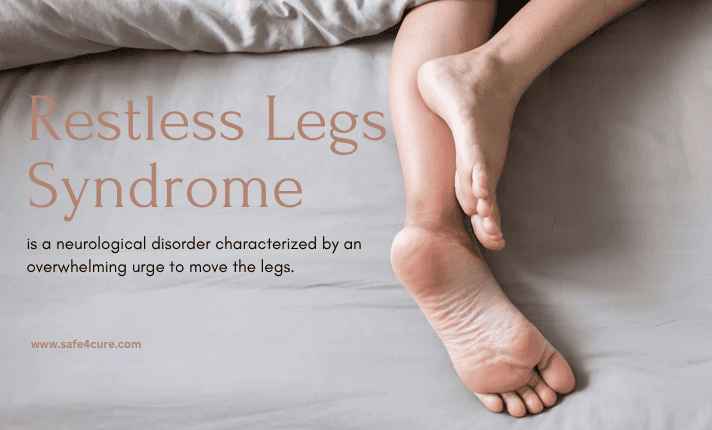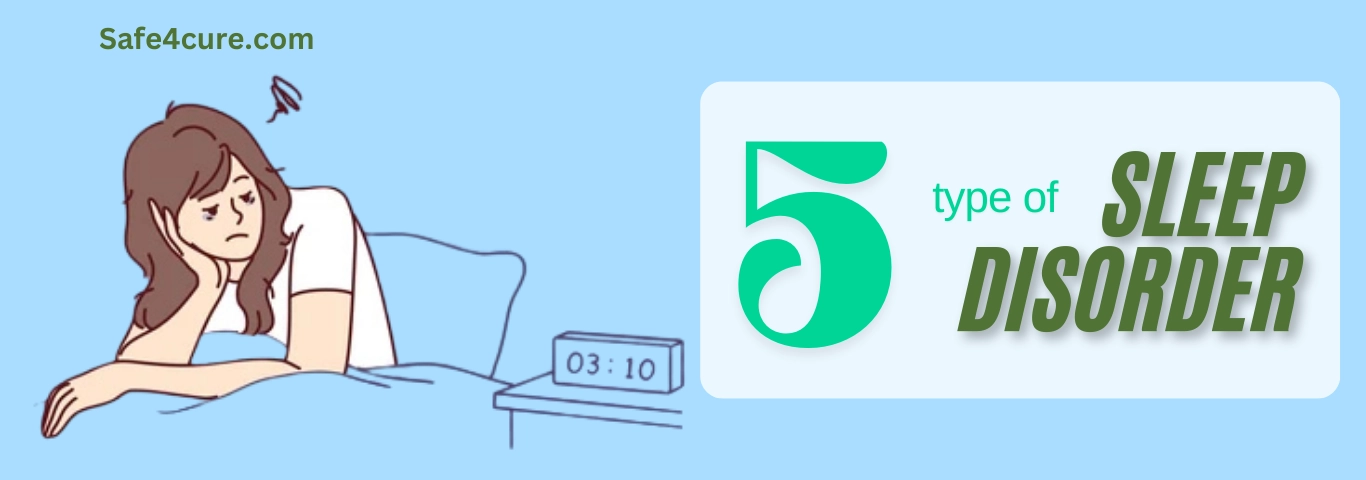Sleep is more than just rest it’s the body’s reset button. From cell repair to memory consolidation, sleep affects everything from your immune system to your mental health. Yet, an estimated 50–70 million adults in the U.S. alone suffer from a chronic sleep disorder.
But what exactly are sleep disorders? And what are the five main types that disrupt people’s lives every day?
This guide covers everything you need to know: definitions, causes, symptoms, and advanced treatment options for each of the 5 most common types of sleep disorders.
What Is a Sleep Disorder?
A sleep disorder is a condition that prevents you from sleeping well on a regular basis. These disorders can lead to daytime fatigue, irritability, lack of focus, and even serious health problems like heart disease, depression, and diabetes.
Sleep disorders are categorized based on the type of disruption they cause:
- Trouble falling or staying asleep
- Unusual behaviors during sleep
- Daytime drowsiness despite sufficient time in bed
- Abnormal breathing or movement patterns
Understanding the five core types is the first step toward diagnosis and treatment.
The 5 Major Types of Sleep Disorders
1. Insomnia – Persistent Difficulty Falling or Staying Asleep
Insomnia is the most common sleep disorder, affecting nearly 1 in 3 adults. It refers to persistent difficulty with initiating or maintaining sleep, despite having the opportunity to sleep.
Causes of Insomnia:
- Psychological: Anxiety, stress, depression
- Lifestyle: Irregular sleep schedule, excessive screen time, jet lag
- Medical: Chronic pain, asthma, acid reflux, hyperthyroidism
- Substance-related: Caffeine, alcohol, stimulants
- Medication-related: Steroids, antidepressants, beta-blockers
Symptoms:
- Lying awake for long periods
- Waking up several times during the night
- Not feeling rested after sleep
- Daytime fatigue, low energy
- Poor concentration or memory
Types of Insomnia:
- Acute (short-term) – often caused by stress or travel
- Chronic (long-term) – occurs at least 3 times per week for over 3 months
Treatment:
- CBT-I (Cognitive Behavioral Therapy for Insomnia) – gold standard non-drug therapy
- Prescription Medications:
▪ Zolpidem (Ambien)
▪ Eszopiclone (Lunesta)
▪ Doxepin (Silenor) - Natural Remedies: Melatonin, magnesium, valerian root
- Sleep Hygiene: Consistent sleep schedule, avoiding electronics before bed
2. Sleep Apnea – Breathing Interruptions During Sleep

Sleep apnea is a disorder where breathing repeatedly stops and starts during sleep. These pauses can last from a few seconds to over a minute and cause oxygen deprivation, disrupted sleep, and even cardiovascular risks.
Types of Sleep Apnea:
- Obstructive Sleep Apnea (OSA): Caused by throat muscles collapsing and blocking the airway.
- Central Sleep Apnea (CSA): Brain fails to signal the muscles that control breathing.
- Complex Sleep Apnea: Combination of both OSA and CSA.
Causes:
- Obesity
- Narrow airways or large tonsils
- Smoking and alcohol
- Nasal congestion
- Age and gender (men are more prone)
Symptoms:
- Loud snoring
- Gasping or choking during sleep
- Dry mouth or sore throat upon waking
- Headaches in the morning
- Severe daytime sleepiness
- Mood swings or irritability
Diagnosis:
- Polysomnography (Sleep Study) – measures oxygen levels, breathing patterns, brain waves
Treatment:
- CPAP Machines (Continuous Positive Airway Pressure) – keeps airways open
- Oral Appliances – adjust jaw/tongue position
- Weight Management – crucial in overweight patients
- Surgical Options – remove excess tissue in airway
- Modafinil / Armodafinil – for persistent daytime sleepiness
3. Narcolepsy – Sudden Sleep Episodes and Daytime Sleepiness

Narcolepsy is a rare but chronic neurological disorder where the brain loses the ability to regulate sleep-wake cycles, leading to sudden, uncontrollable sleep episodes.
Causes:
- Autoimmune destruction of hypocretin (orexin) neurons in the brain
- Genetic predisposition
- Brain injuries (less common)
Symptoms:
- Excessive Daytime Sleepiness (EDS) – overwhelming urge to sleep
- Cataplexy – sudden loss of muscle control, often triggered by emotions
- Sleep Paralysis – temporary inability to move upon waking or sleeping
- Hypnagogic Hallucinations – vivid dream-like experiences during sleep transitions
- Disrupted Nighttime Sleep
Diagnosis:
- MSLT (Multiple Sleep Latency Test)
- Polysomnography
- Hypocretin level testing (CSF test)
Treatment:
- Modafinil/Armodafinil – first-line for EDS
- Sodium Oxybate (Xyrem) – improves night sleep and reduces cataplexy
- Antidepressants – manage cataplexy and hallucinations
- Lifestyle: Scheduled naps, sleep hygiene, emotional support
4. Restless Legs Syndrome (RLS) – Uncontrollable Urge to Move Legs

Restless Legs Syndrome (RLS) is a sensorimotor disorder characterized by an irresistible urge to move the legs, especially during rest or before sleep.
Causes:
- Iron deficiency or anemia
- Pregnancy (especially in the third trimester)
- Diabetes, renal disease
- Neuropathy
- Genetic predisposition
- Certain medications (antihistamines, SSRIs)
Symptoms:
- Crawling, tingling, burning, or itching sensations in the legs
- Symptoms worsen at night
- Movement brings temporary relief
- Trouble initiating sleep
- Daytime fatigue from disrupted sleep
Diagnosis:
- Based on medical history and symptoms
- Iron/ferritin level blood test
Treatment:
- Iron supplements if iron is low
- Dopaminergic medications:
▪ Pramipexole
▪ Ropinirole - Anti-seizure drugs:
▪ Gabapentin
▪ Pregabalin - Warm baths, massage, regular exercise
- Avoid caffeine and alcohol
5. Parasomnias – Abnormal Sleep Behaviors

Parasomnias are a group of abnormal movements, emotions, behaviors, or perceptions that occur during sleep transitions or while asleep.
Types:
- NREM Parasomnias:
▪ Sleepwalking (somnambulism)
▪ Sleep terrors
▪ Confusional arousals - REM Parasomnias:
▪ REM Sleep Behavior Disorder (acting out dreams)
▪ Sleep paralysis - Others:
▪ Nocturnal eating syndrome
▪ Bruxism (teeth grinding)
Causes:
- Genetic predisposition
- PTSD or anxiety disorders
- Sleep deprivation
- Certain medications (e.g., sedatives, SSRIs)
- Substance abuse
- Brain lesions (rare)
Symptoms:
- Acting out dreams (can be violent)
- Sitting up or walking without awareness
- Screaming or crying during sleep
- Sleep talking
- Difficulty waking or recalling events
Treatment:
- Ensure bedroom safety (remove sharp objects, lock doors)
- Clonazepam for REM sleep behavior disorder
- Melatonin as a safer alternative for older adults
- Managing stress and underlying psychological issues
How Are Sleep Disorders Diagnosed?
Diagnosis typically involves a combination of:
- Sleep Diary – track sleep/wake times, quality, and symptoms
- Polysomnography (PSG) – overnight lab sleep study
- Home Sleep Apnea Test (HSAT) – for obstructive sleep apnea
- Multiple Sleep Latency Test (MSLT) – to measure daytime drowsiness
🌿 General Sleep Hygiene Tips for All Disorders
Regardless of type, these habits promote better sleep:
- Stick to a consistent bedtime and wake time
- Keep your bedroom cool, dark, and quiet
- Avoid stimulants like caffeine or alcohol in the evening
- Unplug from screens 30–60 minutes before bed
- Exercise regularly, but not right before sleeping
Final Thoughts: Sleep Disorders Are Manageable
Understanding the five major types of sleep disorders — Insomnia, Sleep Apnea, Narcolepsy, Restless Legs Syndrome, and Parasomnias — is the first step toward taking back control of your health and well-being. These conditions are common, diagnosable, and treatable with the right approach.
If you’re experiencing symptoms, speak with a sleep specialist. And if medications are prescribed, you can explore genuine options like Modafinil, Armodafinil, or Eszopiclone from trusted online pharmacies such as Safe4Cure.com, which offers:




